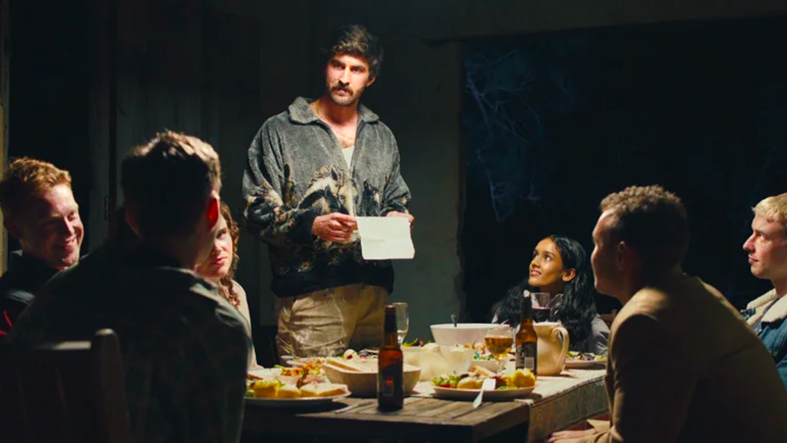‘Birdeater’ SXSW 2024 Review: A Harrowing Look At Toxic Masculinity

Australian filmmakers are known for creating some of the most harrowing and disturbing horror films the genre has ever seen. From the brutal Wolf Creek to the darkly funny The Loved Ones, Australian genre cinema pushes boundaries and breaks taboos to confront societal issues head-on. Jim Weir and Jack Clark’s feature film debut Birdeater is the latest entry in this national cinema. While relatively bloodless compared to its predecessor, Weir and Clark make up for that in rancid vibes and nauseating tension to craft a cautionary tale about men enabling toxic behavior in each other, and how that harm extends out into every single of their relationships.
Birdeater centers, at first, on the strange relationship between Irene (Shabana Azeez) and her fiance Louie (Mackenzie Fearnley). They live together but every night, Louie makes an excuse to leave the house while giving Irene a pill so she doesn’t have anxiety while he’s gone. But instead of working late or visiting his dad, he’s drinking with friends and doing drugs in their basement. Everything about their dynamic feels off, with Irene the epitome of a wilting flower, a person who’s been hollowed out by her partner until there’s nothing left but him. Louie is the guy you despise in your friend group, but everyone else loves. He’s the charismatic one who hides behind goofy boy charm to mask his inherent cruelty and need to control everyone around him.
Also Read: ‘Hunting Daze’ SXSW 2024 Review: A Struggle For Power At The Bachelor Party From Hell
Once Weir and Clark give us a sense of their troubling relationship, we’re taken to Louie’s buck’s night (the Australian equivalent of a bachelor party) with friends Charlie (Jack Bannister), Dylan (Ben Hunter), and Murph (Alfie Gledhill). However, he’s also invited Irene and Grace (Clementine Anderson), Charlie’s fiance. Already Louie is shifting the trip’s dynamic by including women in the traditionally male-only space. As everyone arrives at the isolated cabin in the Australian wilderness, gossip rumors are already swirling about Louie and Irene, alluding to some violent event in the past that makes everyone afraid of Irene.
Again, Weir and Clark swiftly and cleverly establish a complex power dynamic both with romantic and platonic relationships where Louie is the charismatic but biting leader and Irene is tolerated. But as more of the past is revealed and secrets are uncovered, the true nature of every relationship comes to light, illustrating just how much men will protect other men’s bad behavior in the name of control.
The buck’s night setting is the perfect place to interrogate male relationships and the strange things men do together when women aren’t looking. This isn’t The Hangover, but rather a more honest look at men acting like both boys and repulsive monsters in the forest. Weir and Clark are holding a mirror up to the idea of “boys will be boys” to criticize what exactly boys are doing and how it harms not only themselves but their concepts of love and commitment. Both this film and Hunting Daze, which also premiered at this year’s SXSW, are turning the tables on typical depictions of masculinity and male relationships on screen. No longer can we make excuses for men, even fictional ones, and these films are important markers of shifts in attitudes toward toxic masculinity.
Also Read: ‘Family’ SXSW 2024 Review: Brutally Honest Trauma Horror
Fearnley is unsettlingly perfect as the manipulative Louie. On the outside, he looks like a cute nerd with a charming smile. But slowly, he reveals a rotten core, one that reeks of insecurity and jealousy. Fearnley captures that dichotomy so well it made me nauseous. Through his fake smile and angry eyes, I saw flashes of my own abuser who gaslit and morphed me into whatever he needed. Louie is never violent, and yet he’s scarier than any villain as he cruelly takes down his friends to make himself feel superior. No one else matters to him but him.
Hunter also delivers a standout performance as the off-kilter comedic relief and token single dude. But again, Hunter’s delivery paired with Weir and Clark’s take on the character make Dylan a fascinating creature that’s more than just a dopey dude. He’s a glimmer of empathy in a sea of selfishness. Don’t worry, he isn’t a nice guy, but damn if he isn’t fascinating.
Also Read: ‘Oddity’ SXSW 2024 Review: Damian McCarthy’s Latest Is Really Damn Scary
The biggest detriment to Birdeater is a long run-time and a slow pace. Every second is gorgeous to watch, but sometimes the film feels meandering, reveling in a more arthouse tone especially when the sun goes down. The intention makes sense in mimicking a drug-fueled dream-like state, but one-too-many extended sequences of natural landscapes and bizarre male debauchery feel repetitive more than necessary.
Birdeater is the epitome of uncomfortable cinema. Every character makes your skin crawl and every word uttered by a man makes you want to tear off your skin. While that’s typically not the vibe you want for your film, it’s pitch-perfect here in a film that wants you to feel uncomfortable. Weir and Clark want people, especially Australian men, to watch this and understand how we need to change as a culture about holding men accountable for their actions. It’s an upsetting portrayal of emotional and mental abuse and the intricacies of an abusive relationship. Birdeater never offers easy answers because Weir and Clark know the solution is not easy. And yet, it’s important now more than ever to address toxic male attitudes directly rather than using comedy as a mask.
Summary
Birdeater is the epitome of uncomfortable cinema. It’ll make your skin crawl and while its slow pace may deter some, its conclusion is crucial.
Categorized:Reviews

